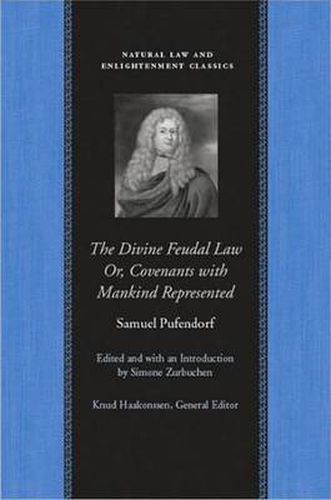Readings Newsletter
Become a Readings Member to make your shopping experience even easier.
Sign in or sign up for free!
You’re not far away from qualifying for FREE standard shipping within Australia
You’ve qualified for FREE standard shipping within Australia
The cart is loading…






Based on his theory of natural law, Pufendorf denounces the Revocation [of the Edict of Nantes in 1685] as an illegitimate and tyrannical act and advocates toleration. The Divine Feudal Law’ can be seen as a complement to the treatise on toleration . Pufendorf attempts to demonstrate in The Divine Feudal Law’ that union of Lutherans and Calvinists is possible on the basis of a theological system containing the fundamental articles necessary for salvation. In contrast, reconciliation between Protestants and Catholics is declared to be impossible. Simone Zurburchen in the Introduction. Originally published posthumously in 1695, The Divine Feudal Law sets forth Pufendorf’s basis for the reunion of the Lutheran and Calvinist confessions. This attempt to seek a conciliation between the confessions complements the concept of toleration discussed in Of the Nature and Qualification of Religion. In both, Pufendorf examines how to secure the peaceful coexistence of different confessions in a state.Features an introduction, selected bibliography, notes and index.
$9.00 standard shipping within Australia
FREE standard shipping within Australia for orders over $100.00
Express & International shipping calculated at checkout
Based on his theory of natural law, Pufendorf denounces the Revocation [of the Edict of Nantes in 1685] as an illegitimate and tyrannical act and advocates toleration. The Divine Feudal Law’ can be seen as a complement to the treatise on toleration . Pufendorf attempts to demonstrate in The Divine Feudal Law’ that union of Lutherans and Calvinists is possible on the basis of a theological system containing the fundamental articles necessary for salvation. In contrast, reconciliation between Protestants and Catholics is declared to be impossible. Simone Zurburchen in the Introduction. Originally published posthumously in 1695, The Divine Feudal Law sets forth Pufendorf’s basis for the reunion of the Lutheran and Calvinist confessions. This attempt to seek a conciliation between the confessions complements the concept of toleration discussed in Of the Nature and Qualification of Religion. In both, Pufendorf examines how to secure the peaceful coexistence of different confessions in a state.Features an introduction, selected bibliography, notes and index.